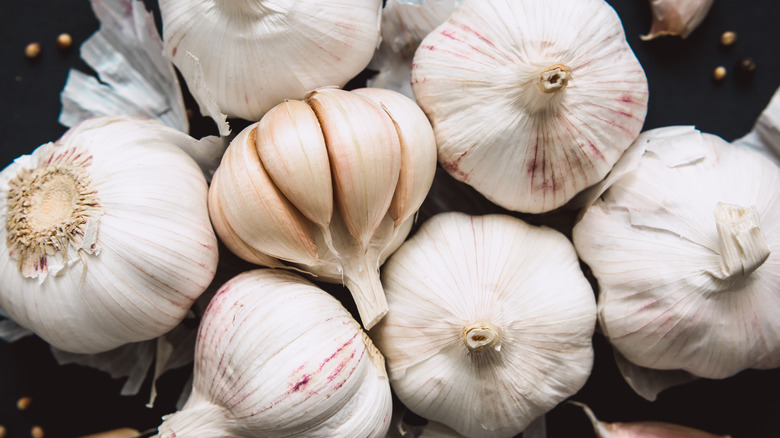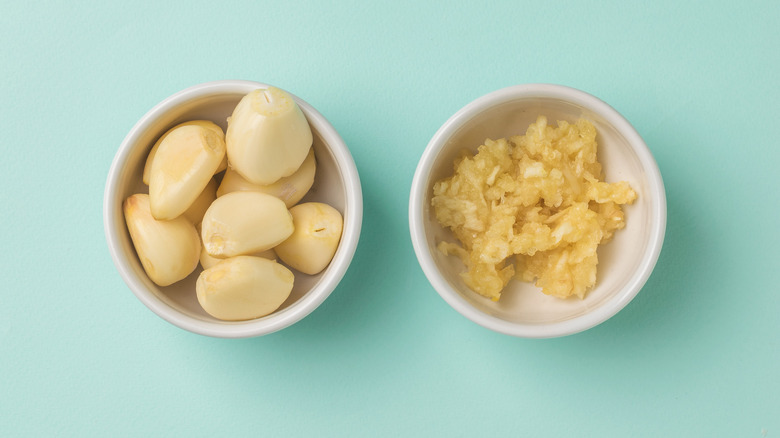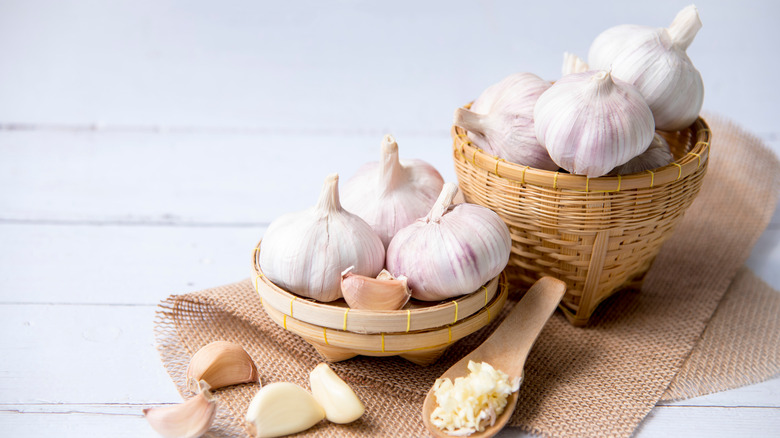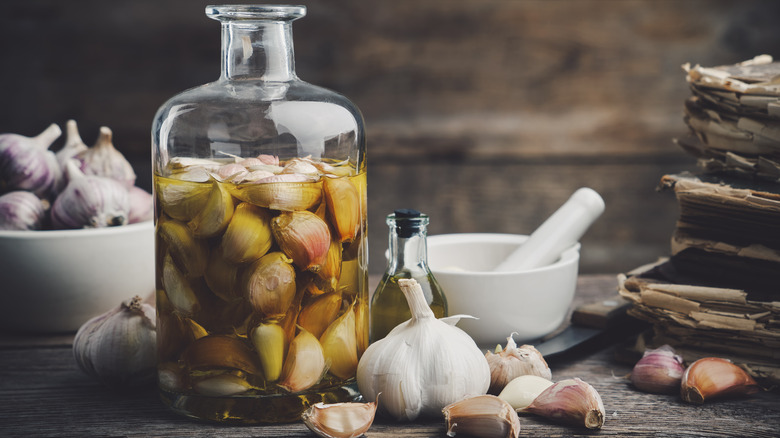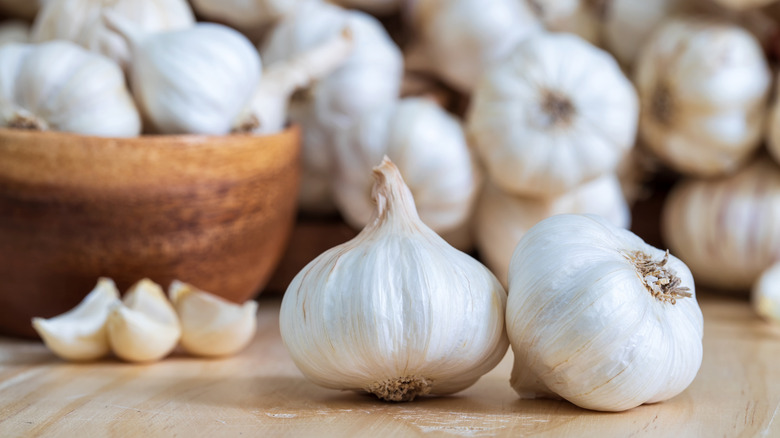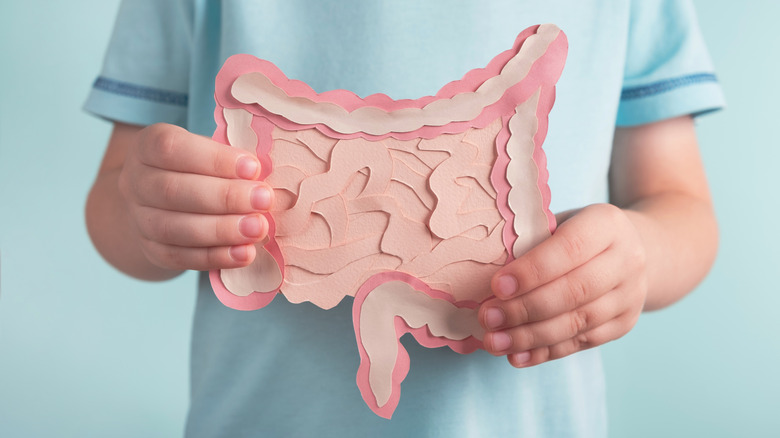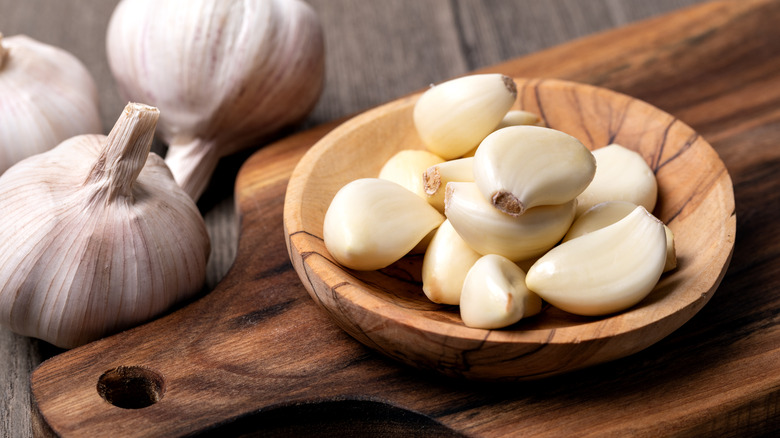14 Ways Garlic Can Benefit Your Health
In our opinion, a meal simply isn't complete without a little garlic. This pungent member of the onion family (which is technically a vegetable, despite being typically used to flavor dishes, according to Healthline) is a staple ingredient in far too many dishes to count, and is used in basically every cuisine around the world. In the United States, garlic is as popular as anywhere else, with Americans consuming two pounds of garlic each per year on average, helping to make a dent in the 400 million pounds that are produced annually by American farms (per AgHires).
While most of us throw copious amounts of garlic into our dishes to help bring them to life (and let's be real here, does anyone not double the amount of garlic that a recipe calls for? Asking for ... us), that's not the only benefit of the spicy ingredient. The same component that makes garlic so tasty also provides your body with powerful health benefits, according to dietitian Laura Jeffers, who states that "it's the organic sulfur compound allicin in garlic that gives it its pungent smell and makes it a healthy addition to your diet" (per the Cleveland Clinic).
In case you were wondering just how good garlic really is for you, we're here to show you the numerous ways garlic can benefit your health.
Garlic could help keep your heart healthy
With heart disease being the primary cause of death amongst American adults (per the CDC), following a diet that prioritizes heart-healthy ingredients is a wise choice. That's why you're in luck if you're a garlic lover, as it could help provide significant benefits to your heart health. Garlic can help reduce the clumping of platelets, the cells that help your blood clot, as well as their buildup in your arteries, says nutritionist Jo Lewin (via BBC Good Food).
It's the active ingredient in garlic, allicin, which provides these heart-helping benefits. Said benefits also include the lowering and maintenance of blood pressure, as research published in The Journal of Nutrition states. Garlic can also help reduce unhealthy cholesterol levels, which aids in keeping your heart in good shape.
However, to get the most benefits for your heart, garlic should be an element in a diet composed of a variety of ingredients that help protect your health. There's a reason why lifelong followers of the Mediterranean diet demonstrate better heart health, after all — the main cornerstones of the diet, including copious amounts of garlic, all work together to keep heart disease at bay, as the Mayo Clinic points out.
It could help reduce inflammation
It's really easy to think of inflammation as something which only happens on the surface of our skin when we scratch too roughly or knock our shins against stuff. But inflammation can occur all over the body, internally and externally. And when it occurs chronically, it can contribute to a huge number of potentially damaging conditions, such as cancer, type 2 diabetes, arthritis, heart disease, anxiety and depression, and dementia (per Harvard Health Publishing).
In many circumstances, inflammation can be made worse (or better) by lifestyle choices, such as what we include in our diet. The addition of garlic in your meals is good news for anybody seeking to keep inflammation at bay, thanks to its anti-inflammatory effects.
Garlic and its active ingredient allicin can provide anti-oxidative and anti-inflammatory benefits for the body when ingested in a variety of forms, according to research published in Anti-Cancer Agents in Medicinal Chemistry. The study discussed the vegetable's potential for benefits with regard to cancer treatment. The research does, however, point towards the fact that the anti-inflammatory benefits from garlic may be fairly subtle, but could amount to a larger benefit over time.
Garlic's great for fighting off illnesses
There are people out there who swear by swallowing a whole, raw clove of garlic when they're not feeling too hot as a remedy. This might not be your first choice for a cold remedy, partly because it could leave you with some pretty potent garlic breath (although this is far more likely when you're chomping it down, according to Livestrong). However, it turns out that there's a lot of truth in the idea that garlic could help your body fight off illnesses.
The allicin in garlic is converted by your body into compounds that contain sulfur, which then help to bolster your white blood cells' response to viruses, according to Healthline. In doing so, common viruses like colds or the flu are fended off with more power, with garlic helping to reduce the severity and length of any such bugs you contract.
This immuno-boosting function that garlic provides isn't just helpful when you're feeling under the weather. Healthier white blood cells help to improve immune function over time, making you better equipped to fend off bugs and preventing you from becoming sick in the first place. Including garlic as part of a varied, healthy diet rich in gut-friendly foods can keep your immune system operating at its full potential.
It can help reduce the prevalence of blood clots
Remember scraping your knee as a kid, and (once your tears had dried up) marveling at the way the blood coming out of it just stops after some time? And then picking away at the scab that formed from it? Well, all of that is down to the frankly amazing process of blood clotting. And while having blood that clots healthily is a good thing in certain instances, there are also situations where it can be bad.
When blood clots occur in the deepest veins in our bodies — a condition known as deep vein thrombosis (DVT) — this can lead to potentially life-threatening consequences like a pulmonary embolism, according to the CDC. Untreated internal blood clots affect almost a million Americans each year, causing approximately 100,000 deaths.
The inclusion of garlic in your diet, however, is an easy way to prevent such blood clots. "Compounds in garlic (and onions) have been shown to decrease the 'stickiness' of our platelets and have anti-clotting properties," shares San Diego-based registered dietitian nutritionist Wendy Bazilian, author of the "Eat Clean, Stay Lean" series, with Everyday Health. This can help prevent not only conditions like DVT and its consequences, but also the hardening of arteries from plaque build-up, which can increase your risk of heart disease.
It could help your skin stay glowing
The beauty market in the U.S. is almost incomprehensibly large. According to Statista, an eye-watering $89.5 billion was spent on cosmetics in 2018. That said, there are other ways you can boost your skin's health and appearance that don't cost as much as face creams do — and adding a few cloves of garlic to your evening meals is one of them.
Garlic is particularly beneficial for skin health thanks to its anti-inflammatory and anti-microbial properties, according to Medical News Today. The allicin present in garlic can help reduce the growth of certain bacteria that contribute to poor skin health and skin conditions like acne.
As acne and other skin conditions are associated with inflammation, garlic's potential to help reduce this could be invaluable. A review in Dermatology Reports also notes that the application of garlic extract directly to the skin could also provide benefits for a range of other skin conditions like psoriasis, as well as having general rejuvenating and anti-aging effects. The review does point out, however, that this needs further study — so maybe hold tight before you rub a clove of garlic all over your face and cause people to steer clear of you.
Eating garlic gives your body an antioxidant boost
Now, it'll probably come as little surprise that we're big fans of foods that provide our bodies with antioxidants. These components, which can help your body fight against free radicals and the huge amount of damage they can cause (per Medical News Today), are the cornerstones of a healthy diet — and luckily, garlic can provide the antioxidant kick you need.
The vegetable contains natural antioxidants when ingested fresh, according to a study published in Food Science and Biotechnology. When prepared in certain ways, garlic's antioxidant potential can become even more powerful. Aged garlic and black garlic have been observed to have much higher levels of antioxidants (via Phytotherapy Research and Food Chemistry).
As with many of garlic's other benefits, this is all thanks to its allicin content. Allicin not only provides garlic's distinct flavor, but also produces antioxidants when it breaks down, according to Science Daily. Pretty cool for an unassuming everyday ingredient, right?
Garlic can help boost your brain
Forget eating just fatty fish like salmon and tuna to boost your brainpower (okay, no, don't actually do that, as they're really good for you). Including garlic in your diet daily could also give your brain a much-needed health boost.
Certain preparations and types of garlic may be particularly beneficial for this, writes nutritionist Cynthia Sass for Health. Specifically, aged garlic extract can help support memory function and learning skills, as well as reduce the effects of cognitive decline through its protection and maintenance of brain neurons.
What's more, garlic could also be an important ally in the fight against age-related brain diseases like Alzheimer's disease. Aged garlic extract could help to combat certain changes in the brain that come before the development of Alzheimer's and other brain conditions, according to research published in Experimental and Therapeutic Medicine. The study does point out, however, that although garlic has the potential to be quite beneficial, there are multiple factors involved in the development of Alzheimer's, which means further research is needed to accurately gauge the vegetable's effectiveness in this area.
Garlic can support your liver health
Our livers do a lot of work, from the production of bile and protein to the clearing of toxins to regulating our blood clotting (per Johns Hopkins Medicine). That's why doing what we can to keep our liver healthy is vital, and why garlic could be your best friend in doing so. Chock-full of anti-inflammatory and antioxidant compounds such as allicin and alliin, consuming garlic regularly could help reduce the risk of several liver-specific diseases like liver cancer and nonalcoholic fatty liver disease (or NAFLD), according to Healthline.
As a study published in Nutrients shows, eating raw garlic could help to reduce the risk of developing liver cancer. The study found that for people who ate raw garlic twice weekly or more, there was a 23% less risk of developing the cancer, whereas people who ate raw garlic less frequently than that showed less decrease in risk. Meanwhile, findings published in the European Journal of Endocrinology found that consuming raw garlic daily resulted in a decreased risk of NAFLD amongst Chinese men, although it's worth pointing out that the same association wasn't found for Chinese women who took part in the study.
Garlic can help to keep your blood pressure low
Any changes that we can make to our diet or lifestyle that can help reduce our blood pressure are changes worth making. And if you're wondering about whether consuming more garlic could benefit your blood pressure, we've got some good news for you.
Eating garlic regularly may aid in keeping your blood pressure low, according to Sudha Raj, a registered dietitian nutritionist and teaching professor at Syracuse University's Falk College of Sport and Human Dynamics (per Everyday Health). Raj states that "garlic stimulates the synthesis of nitric oxide, which dilates blood vessels, and inhibits ACE (angiotensin-converting enzyme) activity." The reduction of ACE activity helps to keep your blood vessels relaxed, and all of this equates to healthier blood pressure.
Garlic and garlic supplements were also shown to be beneficial for blood pressure in research published in Experimental and Therapeutic Medicine, particularly among subjects who have hypertension. Aged garlic was shown to be particularly effective at reducing blood pressure, as well as reducing stiffness in arteries.
Your gut will love garlic
Let's talk about gut health, baby. Eating foods that have a positive effect on gut health won't just keep your belly happy. Maintaining a positive balance of bacteria in the gut affects your entire body, as WebMD states. That's why seeking out food that positively impacts your gut health is so important — and why garlic should be top of the list.
Garlic, along with other foods like salmon and yogurt, can act as a prebiotic for your gut, according to Eat This, Not That. Prebiotics, which move through your gut without being digested, is catnip for the good bacteria in your stomach, which chow down on them, helping them to grow and multiply. The miracle component that makes garlic so effective for gut health is the fructans found in the vegetable, which make up the majority of its fiber content. These fructans promote the growth of bifidobacteria in the gut, as research published in Food Science and Human Wellness shows. And all of this leads to positive benefits for your gut (and your general health).
Garlic may keep your bones healthy
When it comes to bone health, the discussion typically centers almost exclusively around calcium. Milk = strong bones, right? Well, the reality is there are many factors at play when it comes to maintaining bone health, and it's important to consider not only your diet in its entirety, but also the changes your body might be going through depending on which stage of life you're at.
For individuals who are going through or have gone through menopause, estrogen deficiency can be a factor in the development of osteoarthritis, according to research published in Arthritis Research & Therapy. However, the inclusion of garlic in the diet (specifically by taking a garlic tablet) has been observed to reduce cytokine production that contributes to the development of osteoarthritis in postmenopausal women, per a study from the Journal of Dietary Supplements. Meanwhile, a larger-scale study also showed that including garlic in the diet showed a reduced risk of developing hip osteoarthritis in later life (via BMC Musculoskeletal Disorders).
Eating garlic could help your workout
You might not think that such a tiny aspect of a diet (well, tiny for some — garlic is a huge aspect of ours) could have any proper effect on how well you work out. Well, folks, we're here to tell you that in fact, eating garlic could help you get the most out of your exercise sessions. This is according to a study published in the Turkish Journal of Medical Sciences, which examined the effects of garlic on college athletes and their athletic performance and aerobic abilities. Researchers found that just a single dose of garlic produced positive effects on the athletes' performance time and aerobic performance. We don't know about you, but we think that's pretty cool.
This might not come as such a big surprise to some, though. After all, in Ancient Greece, garlic was given to Olympic athletes as a performance enhancer and has also been used throughout history as a way to increase physical performance, states research published in The Journal of Nutrition. Interestingly, the paper also points out that since many ancient cultures weren't in contact with each other, they all found that garlic helped to improve physical performance independently. Hey, if it ain't broke, don't fix it, right?
Eating garlic regularly could keep your hair in good health
Do you crave long, strong, flowing, bouncy, luscious hair? Maybe a couple of extra adjectives, too, for good measure? If you do, don't be fooled by hugely pricey cosmetic items. Instead, focus on what you're eating.
Our diets have a huge effect on hair health, and adding garlic to meals could have powerful benefits as well. The first reason for this is garlic's nutritional composition, with the vegetable delivering a boost of essential vitamins and minerals like vitamin C, manganese, selenium, and vitamin B6. All of these can give your hair health a boost, states Healthline.
Garlic also contains powerful antimicrobial properties that can promote hair health. Interestingly, you might not have to eat garlic just to obtain its hair benefits. Topical application of garlic on your hair through a hair mask (as Healthline says) may also help your mane enjoy its benefits. Bear in mind, however, that when applying a hair mask with garlic, you should avoid touching your eyes and limit contact with your skin, as the vegetable can act as an irritant.
Eating garlic can keep your eyes healthy
Carrots aren't the only vegetable that can help you see in the dark. Eating garlic regularly is a lesser-known way to maintain good eye health, thanks to a key part of its composition.
Garlic, as well as other members of the allium family like onions and shallots, can boost your levels of glutathione, a highly important antioxidant (per Healthline). This is due to the compounds in the vegetables that contain sulfur, which the body uses to synthesize glutathione.
Glutathione's benefits for the body are almost too numerous to name, with the antioxidant assisting in everything from DNA composition and function to keeping your liver working correctly to the processing of vitamins (via Medical News Today). But one key function of glutathione lies in its maintenance of your eye's lenses, as research published in the Journal of Ocular Pharmacology and Therapeutics says. As glutathione exists in high amounts in the lens, keeping your glutathione levels steady helps to maintain its function and slow its deterioration due to age. Throwing an extra clove of garlic into your nightly meal could be a simple way to do just that.

